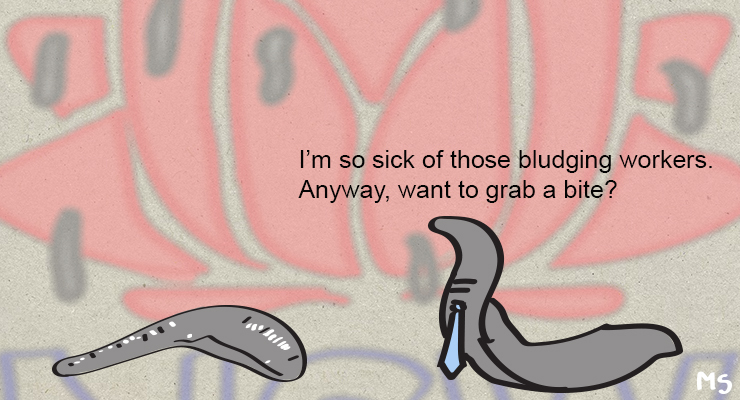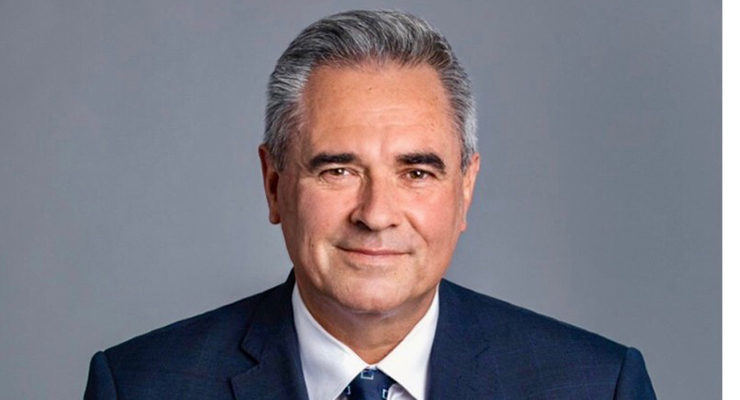
NSW’s $600,000 man-about-town in London, Stephen Cartwright, has an interesting history of contributions to public policy in that state.
Cartwright — classified as a “problem” by Premier Dominic Perrottet — clearly thinks highly of himself: for the role of NSW agent-general in London, Cartwright demanded $800,000 a year. That’s nearly twice as much as the premier earns and more than twice as much as the Commonwealth’s high commissioner earns.
Despite encouragement from Gladys Berejiklian’s chief of staff that Cartwright be given a massive wad of money, he eventually had to make do with just $600,000 a year after negotiations with Investment NSW head Amy Brown in which he threatened to take the pay dispute to the premier.
Fortunately, he has a generous expenses account — he’s racked up more than $100,000 in just nine months, including for a doubtless much-needed trip back to Sydney after just three months in Blighty.
Cartwright won the London gig after a lengthy stint as CEO of Business NSW, the more recent name for what long existed under the rather fusty title of NSW Business Chamber.

Keen-eyed readers may be able to spot a certain tension between Cartwright’s attitude to his new gig, and his observations about the state’s workers while representing the peak lobby group of NSW business.
While Cartwright thought he could take his dispute over pay straight to the state premier, as head of Business NSW he objected strongly in 2019 to federal Labor’s plan to establish a wage theft tribunal, saying it would deluge employers with greedy workers looking to “double-dip”. It would be a “no-risk casino” for workers, apparently.
Not at all like getting a job with the NSW government, then.
Cartwright doesn’t seem to have been especially fond of workers, it has to be said. In 2013 he railed against them taking sickies before a long weekend. “It’s an obvious stunt that only serves to damage personal reputations and morale in the workplace,” Cartwright lectured. “Nobody is fooled by the Friday ‘sickie’.”
Cop that, bludgers.
The following year he noted that many welfare recipients didn’t want to work.
Cartwright’s one big contribution to public debate was in 2019, when he proposed that business be allowed to move workers on to a “perma-flexi” category whereby they would face permanent “flexible” rostering. He was horrified by Labor’s proposal to enable casual workers to apply to move to permanent status, even though employers could refuse them. He wanted “less interference from the nanny state in the employment relationship, not more”.
Cartwright also applauded when the O’Farrell government slashed workers’ compensation, including ending journey-to-work claims and capping compensation. The people of NSW should be “very pleased”, he declared — presumably right up until they got injured on the way to work. To his credit, Cartwright later changed position after the scandalous failures of Icare became apparent under Perrottet’s treasurership, prompting him to call for an urgent inquiry into the failed government insurer.
Cartwright also opposed climate action, railing at the Gillard government’s carbon pricing scheme in 2013, suggesting “the notion that Australia, as one of the smallest carbon emitters, can be the leader on this issue is foolhardy and unrealistic”.
Among Cartwright’s other contributions were traditional business lobbyist positions such as support for fracking, support for higher immigration and loathing of penalty rates. He was also outraged when then senator Rex Patrick dared to use corporate tax data to call out CEOs of companies that failed to pay tax, lamenting it had “the potential to mislead citizens about the transparency and integrity of highly visible business leaders in this country”.
Ah — transparency. Cartwright had views on that, too. Early on his time at the Business Chamber he was moved to anger by NSW ICAC’s proposal to improve transparency around lobbying — including a cooling-off period for former ministers and staffers, meeting diaries for lobbying meetings with ministers, and an expansive lobbying register.
These are all now standard requirements for lobbying in NSW and have been in place for years, providing some much-needed transparency around who is trying to sway NSW ministers. The Perrottet government recently decided to expand them still further.
But it was a different story for Cartwright. The changes were an “assault on the ability of community organisations to interact with government” and would just lead to more red tape, he reckoned.
Given recent events, it seems unlikely Cartwright has grown any fonder of transparency.








Can anyone explain why a State needs an Agent-General and staff in London and elsewhere? Surely Australia House has all the necessary prerequisites to act on behalf of all States and Territories when required?
How much is this boondoggle for retired friends of the Party in power costing us, the residents of each State, and are we getting any value for our money?
Just asking!
ENTITLEMENT, thy name is Stephen Cartwright
Old colonial artifacts, these offshore QUANGOs superseded by digital technology, existing business networks, supply chains and more qualified Australians on the ground offshore.
This includes Austrade, state tourism, education and business etc. which are only needed to provide big face jobs for the boys and girls, and an excuse to visit by others…..
Yes, I want to know. $600,000 is a huge sum of money for one guys wage from the state. How is that justified compared to other state employees.
At least 3 nurses and I know which I would prefer!
As a former public servant who worked for over 30 years with both Austrade and NSW Trade & Investment, I can assure you these State colonial outposts are entirely a waste of time and money. I challenge Mr Cartwright to identify a single opportunity or achievement that wouldn’t have come to NSW regardless of his office and expense account. Former Premiers Greiner and Fahey had the right idea when they abolished these sinecures, only to have Baird and now Perrottet re-establish and extend them.
What does an Agent General actually do? Is there a job description? Are there KPIs? Can anyone quantify the public benefits achieved by the incumbent of the position? Are there any material benefits to the citizens of NSW or are they purely ineffable?
Who knows but the title sounds very grand and self important.
It’s a publicly funded sinecure for freeloaders and chancers emerging from the conga line of suck holes. Both sides of politics abuse it.
Cartwright sounds like a perfect candidate for Liberal Party leader. But it doesn’t pay as much as his London gig.
I’m curious to know how long his tenure is as NSW A-G in the UK?
Well, he seems like an inspired choice. Is this more of Amy Brown’s work?
Would be interesting to find out, and to learn who his referees were. Another cabal of Liberal Premiers and key influencers, no doubt.
This posturing, two-faced piece of snot should be right at home with the current Tory party.